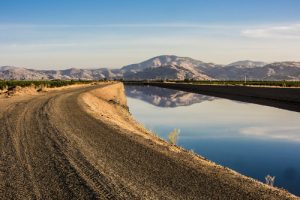
Recent action by the U.S. Bureau of Reclamation marks a critically important step forward in restoring lost water capacity to the California communities served by eight irrigation and water districts along the Friant-Kern Canal (FKC), said U.S. Rep. Kevin McCarthy (R-CA).
“There is still work to be done, but Reclamation’s actions today represent a significant milestone in supporting the more than one million acres of farmland that provide sustenance to the United States and across the globe,” Rep. McCarthy said on July 6 when the bureau released a feasibility report outlining repairs for the FKC.
Specifically, the bureau provided Congress with the final feasibility report under Section 4007 of the Water Infrastructure Improvements for the Nation (WIIN) Act for the FKC Middle Reach Capacity Correction Project. The 152-mile FKC in California’s Central Valley plays a vital role in delivering water south to Bakersfield, Calif.
Under the WIIN Act, which was championed by Rep. McCarthy, Section 4007 of the law created a process by which water infrastructure projects, like the FKC Middle Reach Capacity Correction Project, can be authorized by Congress and provided federal funds of up to 50 percent of total project costs.
With the Bureau of Reclamation issuing a final feasibility report for the FKC project, funds now may be requested by the U.S. Department of the Interior (DOI) and subsequently appropriated by Congress for construction of the project. The FKC feasibility report is the first such report to be sent by the DOI and bureau to Congress following enactment of the WIIN Act in 2016.
According to the bureau, the FKC Middle Reach, an approximately 33-mile section located within Tulare and Kern counties, Calif., has experienced significant capacity loss as a result of regional land subsidence that has occurred over the past decade, original design deficiency, and other factors that prevent the intended flow capacity.
“Water is the lifeblood that supports our communities and the food we grow on the east side of the Central Valley,” said Rep. McCarthy. “However, subsidence on the Friant-Kern Canal is adversely impacting many communities’ ability to get the water they contract and pay for through the canal, including in Kern and Tulare counties.”
The FKC project is being developed to provide improvements to restore its capacity and will include design features, such as sufficient embankment height, pressurized siphons below road crossings and other structures that will maintain design capacity as future land subsidence occurs during the project service life, according to the bureau.
Rep. McCarthy commended U.S. Interior Secretary David Bernhardt and Bureau of Reclamation Commissioner Brenda Burman for their work to finalize the feasibility report. “I also want to thank Friant Water Authority Chairman Chris Tantau, CEO Jason Philips, and other local stakeholders for their support and commitment to advancing this project,” the congressman said.
Secretary Bernhardt and Commissioner Burman also thanked Rep. McCarthy for furthering the Trump administration’s commitment to America’s farmers in need of more water, as well as the administration’s efforts toward addressing reliable water and power delivery in the West.
Rep. McCarthy also received congratulations from California’s Friant Water Authority Chairman Chris Tantau; Friant Water Authority CEO Jason Philips; Arvin-Edison Water Storage District President Edwin Camp; Porterville Irrigation District Chairman Eric Borba; Kern County Farm Bureau President John Moore; and Tulare County Farm Bureau President John Guthrie.



